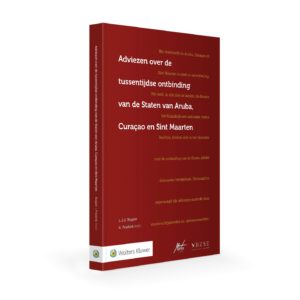ST. MAARTEN CONSTITUTIONAL LAW
Never a dull moment
In St. Maarten there is again a lot of discussion about political developments, but also about constitutional law. I will answer some frequently asked questions here. Of course, I didn’t come up with all the answers myself. At the bottom of this text the most important source is mentioned.
Can parliament fall? Can parliament have an outgoing status? The answer is no. If parliament is dissolved, it remains fully empowered. The dissolution becomes effective on the date on which the newly elected parliament meets (Section 59(3) Constitution). Professor Van Rijn and professor Rogier are also of the opinion that parliament retains the full mandate of the voters before and after the fall of a government, since the dissolution of parliament only takes effect at the moment that the newly elected parliament meets for the first time.
Does the government have the power to dissolve parliament? Yes, the government has the power to do so (Section 59(1) Constitution). No consultation with or approval of parliament is required. In the framework of a ‘fair’ balance of power, parliament can dismiss the government, but the government can dissolve parliament. A possible (and often given) reason for the dissolution and new elections is, for example, that because of ship jumpers it is unclear whether parliament still reflects the will of the people. It should not be forgotten that, from a constitutional point of view, parliament is the supreme authority, but that authority derives from the fact that free and independent elections have taken place: elections give parliament its legitimacy. Members of parliament should, therefore, serve the interests of the whole country and the whole population, in other words, the public interest.
What are the powers of an outgoing government? An outgoing government has a caretaker role and is authorized to deal with urgent and current matters. These concepts are not strictly defined, so the government has a certain degree of freedom to interpret them itself. Can parliament prohibit the government from entering into an agreement, for example? Parliament cannot give binding instructions to the government, such as, for example, an instruction not to enter into agreements. If parliament wants special powers or more detailed rules for an outgoing government or minister, a National Ordinance can be adopted, but only with a minimum of two-thirds of the votes cast (Section 33(3) and 33(4) Constitution).
Is it allowed to replace an outgoing (‘demissionair’) government with an interim government? The starting point is that parliament ought to have the final say in this discussion. An outgoing (‘demissionair’) government also needs the confidence of a parliamentary majority. If elections are imminent, parliament will retain its rights and the confidentiality rule will continue to operate. A parliament has no outgoing status, because a situation should never arise in which there is no elected representative body available. I refer to what took place in Curaçao in 2012. After further advice and consultation, the Governor of Curaçao also went down this road and charged an ‘informateur’ and then a ‘formateur’ with the formation of an interim government under the leadership of Prime Minister Betrian, which did enjoy the confidence of the majority of parliament.
Interesting to know is that professor Bovend’Eert in 2012, in the case of Curaçao, stated that in the prevailing view of constitutional doctrine and constitutional practice in the Kingdom, it must be assumed that the rule of confidence no longer applies to an outgoing government. He wrote that in an opinion he had written in 2012 at the request of the Schotte government. However, in the Dutch situation Bovend’Eert thinks otherwise, according to an article in De Volkskrant (‘The parliamentary system was raped’) of 15 December 2006. Bovend’Eert calls it ‘politically indecent’ that, despite a motion of no-confidence, outgoing (‘demissionair’) Minister Verdonk remained in office. A constitutional novelty that a House of Representatives should not have allowed to pass, he says according to this article.
I think it is fair to say that the prevailing view of constitutional doctrine is that if the majority in parliament is of the opinion that a minister should resign immediately, then that minister (also if he is already outgoing; ‘demissionair’) should do so. That is different if it were all ministers. After all, it must be possible to govern.
Relevant provisions from the Staatsregeling of St. Maarten (the Constitution)
Section 33 Constitution of St. Maarten:
- The Prime Minister and other Ministers are appointed and dismissed pursuant to a national decree.
- If a Minister no longer has the confidence of Parliament, he will resign from his post.
- With regard to the second subsection further rules can be laid down in a national ordinance.
- Parliament may not approve or resolve to propose such a draft national ordinance without a majority of at least two-thirds of the votes cast by its current members.
Section 40 Constitution of St. Maarten:
- National ordinances and national decrees are signed by the Governor and by one or more Ministers.
- The national decree by which the resigning Minister President is dismissed and by which his successor is also appointed, will also be signed by the latter. The national decrees by which the other Ministers are appointed or dismissed are also signed by the Minister President.
Section 59 Constitution of St. Maarten:
- Parliament can be dissolved pursuant to a national decree.
- The decree dissolving Parliament also includes the order for a new election for the dissolved Parliament and for the assembly of the newly elected Parliament within three months.
- The dissolution becomes effective on the date on which the newly elected Parliament meets.
Main source:
Almost everything about this subject can be found in: L.J.J. Rogier en K. Frielink (red.), Adviezen over de tussentijdse ontbinding van de Staten van Aruba, Curaçao en Sint Maarten (‘Opinions on the interim dissolution of the Parliaments of Aruba, Curaçao and Sint Maarten’), Deventer: Wolters Kluwer 2017, 164 pages.
Karel Frielink
(Lawyer/Attorney)
(28 September 2019)
.




